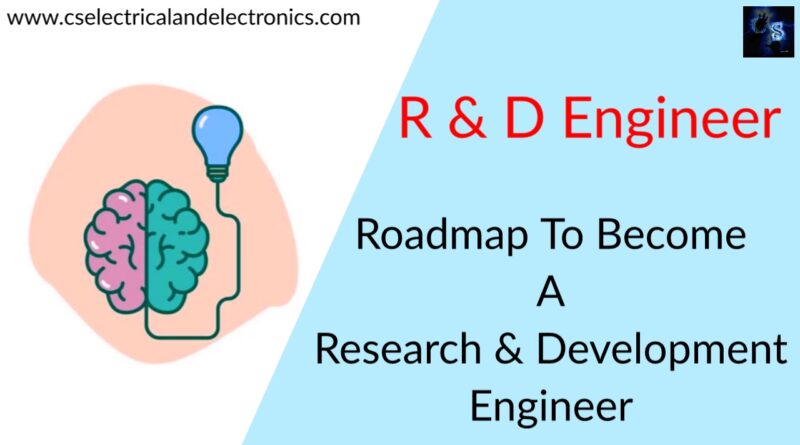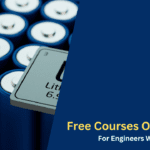Roadmap To Become A Research & Development (R & D) Engineer
Hello guys, welcome back to my blog. In this article, I will discuss the roadmap to become a research & development (R & D) engineer, the skills required to become an R and D engineer, what is an R&D engineer, what does an R&D engineer does, etc.
If you have any doubts related to electrical, electronics, and computer science, then ask question. You can also catch me @ Instagram – Chetan Shidling.
Also, read:
- Roadmap For How To Become An IoT Engineer, Internet Of Things
- Roadmap To Become A Robotics Engineer, Skills, Jobs, Responsibilities
- Roadmap To Become A Power Electronics Engineer, Responsibilities, Skills
Roadmap To Become A Research & Development Engineer
It’s vital to think about what a research and development engineer does before pursuing a career in this field. Knowing what to expect in terms of responsibilities, a typical income, and the job’s unique needs will help you decide if this is a desirable vocation.
In this post, we define the function of an R&D engineer, explain what they do and how much they earn, and provide information on how to become an R&D engineer as well as the skills required.
What is an R&D Engineer?
An R&D engineer works for a corporation and is responsible for research and development. They conduct a range of experiments and activities using research ideas, concepts, and models. R&D engineers not only develop new goods but also revamp current ones. Overall, they want to enhance their company’s present technologies and develop new ones to boost their industry and market position.
What does an R&D Engineer do?
The responsibilities of an R&D engineer vary depending on the sector they work in, the goods they develop, and the firm they work for current products. Despite the diversity, they have certain similar responsibilities, such as the following:
01. Creating mockups of suggested goods, creating product drawings, calculating product measurements, and designing a range of products.
02. Creating product concepts and overseeing the development of such concepts.
03. To guarantee project completion, lead project teams, and manage all team members.
04. Creating precise strategies for managing product development and manufacturing with multiple departments, including engineering and marketing.
05. Conducting market research to identify what sorts of items people want to buy and to assess the present market performance of an existing product.
06. Working on mock-ups of product designs with other engineers and developers.
07. Collaborating with the marketing department to develop sales strategies for upcoming corporate items.
How to Become an R&D Engineer?
While R&D engineers have a wide range of educational backgrounds owing to varying company needs, there is a broad career path you may follow to assist you to get into this field. To assist you to seek a career as an R&D engineer, follow these steps:
01. Earn a bachelor’s degree
While a bachelor’s degree isn’t required for all R&D engineers, it is frequently a desirable qualification. Consider pursuing a bachelor’s degree in Engineering or a closely related subject such as biotechnology. If you don’t want to seek a degree, make sure you have job experience in the business or R&D to demonstrate your knowledge of the area.
02. Complete an internship
Consider applying for an internship in the industry that will allow you to obtain experience relevant to this career. Though an internship isn’t required to pursue this job, it might help you impress hiring managers and set yourself apart from other applicants.
03. Get licensed
If you want to work as an R&D engineer, you should consider getting a license. Getting your license in this field might provide you an advantage in the application and interview process, like an internship. In addition, while recruiting R&D engineers, certain organizations demand specialized licenses.
To get your license, you’ll need four years of experience under the supervision of a professional engineer and a passing score on the National Council of Examiners for Engineering and Surveying’s Fundamentals of Engineering test (NCEES).
04. Earn your Certification
You can also pursue certification in this subject in addition to your license. Consider obtaining certification in an engineering specialty, since this may assist you in moving further in your career.
Skills to Become an R&D Engineer
As an R&D engineer, you’ll need a certain set of skills to do your work well. While soft talents are crucial, you’ll also need hard or technical abilities to thrive in this position. As an R&D engineer, you’ll require the following skills:
01. Communication skills
From the beginning of a product’s development until its conclusion, an R&D engineer interacts with not just the rest of the R&D team, but also a range of other teams. Strong communication skills enable you to interact effectively with everyone you meet and enable you to develop thorough product strategies for each project.
02. Mathematics skills
R&D engineers utilize math to determine product dimensions and create schematics for new goods.
03. Analytical skills
R&D engineers do study and assess product design concepts using their analytical talents. R&D engineers must be organized and remain on top of all their responsibilities because they oversee every aspect of a product’s development and lead several teams.
04. Computer skills
R&D engineers employ their computer abilities regularly when dealing with a range of software packages.
To summarize, According to Indeed Salaries, the national average income for research engineers is $95,540 per year. Your compensation in this area, however, will vary based on your degree of experience, geographic region, and company.
I hope this article ” Roadmap To Become A Research & Development Engineer ” may help you all a lot. Thank you for reading ” Roadmap To Become A Research & Development Engineer “.
Also, read:
- Roadmap For How To Become An IoT Engineer, Internet Of Things
- Roadmap For Power Engineering, Scope, Companies, Job Profile, Salary
- Roadmap How To Develop A Website From Beginning
- Roadmap To Become A Big Data And Analytics Engineer
- Roadmap To Become A Blockchain Developer, Skills, Scope, Salary
- Roadmap To Become A Content Writer, Jobs, Salary, Skills Required
- Roadmap To Become A Digital Marketer, Responsibilities, Skills, Jobs
- Roadmap To Become A Embedded Engineer, Jobs, Roles, Responsibilities
Author Profile
- Chetu
- Interest's ~ Engineering | Entrepreneurship | Politics | History | Travelling | Content Writing | Technology | Cooking
Latest entries
 All PostsApril 29, 2024Top 11 Free Courses On Battery For Engineers With Documents
All PostsApril 29, 2024Top 11 Free Courses On Battery For Engineers With Documents All PostsApril 19, 2024What Is Vector CANoe Tool, Why It Is Used In The Automotive Industry
All PostsApril 19, 2024What Is Vector CANoe Tool, Why It Is Used In The Automotive Industry All PostsApril 13, 2024What Is TCM, Transmission Control Module, Working, Purpose,
All PostsApril 13, 2024What Is TCM, Transmission Control Module, Working, Purpose, All PostsApril 12, 2024Top 100 HiL hardware in loop Interview Questions With Answers For Engineers
All PostsApril 12, 2024Top 100 HiL hardware in loop Interview Questions With Answers For Engineers








